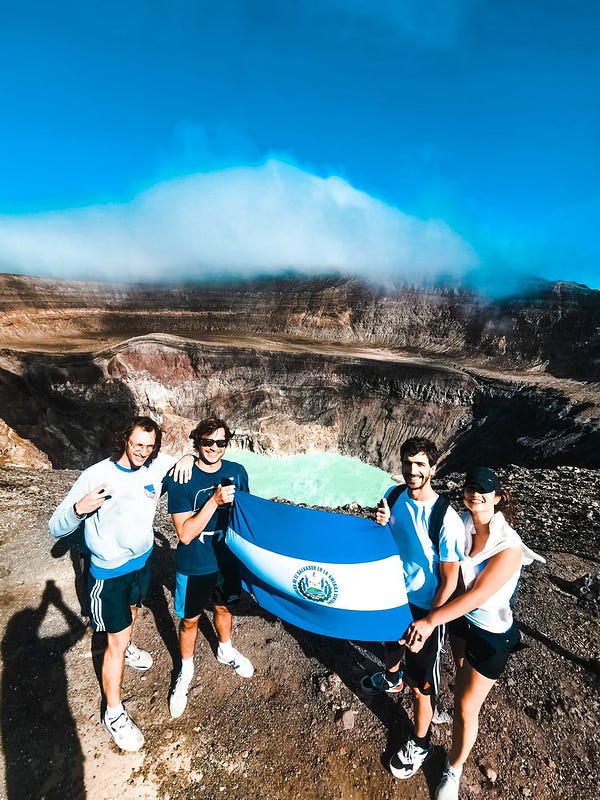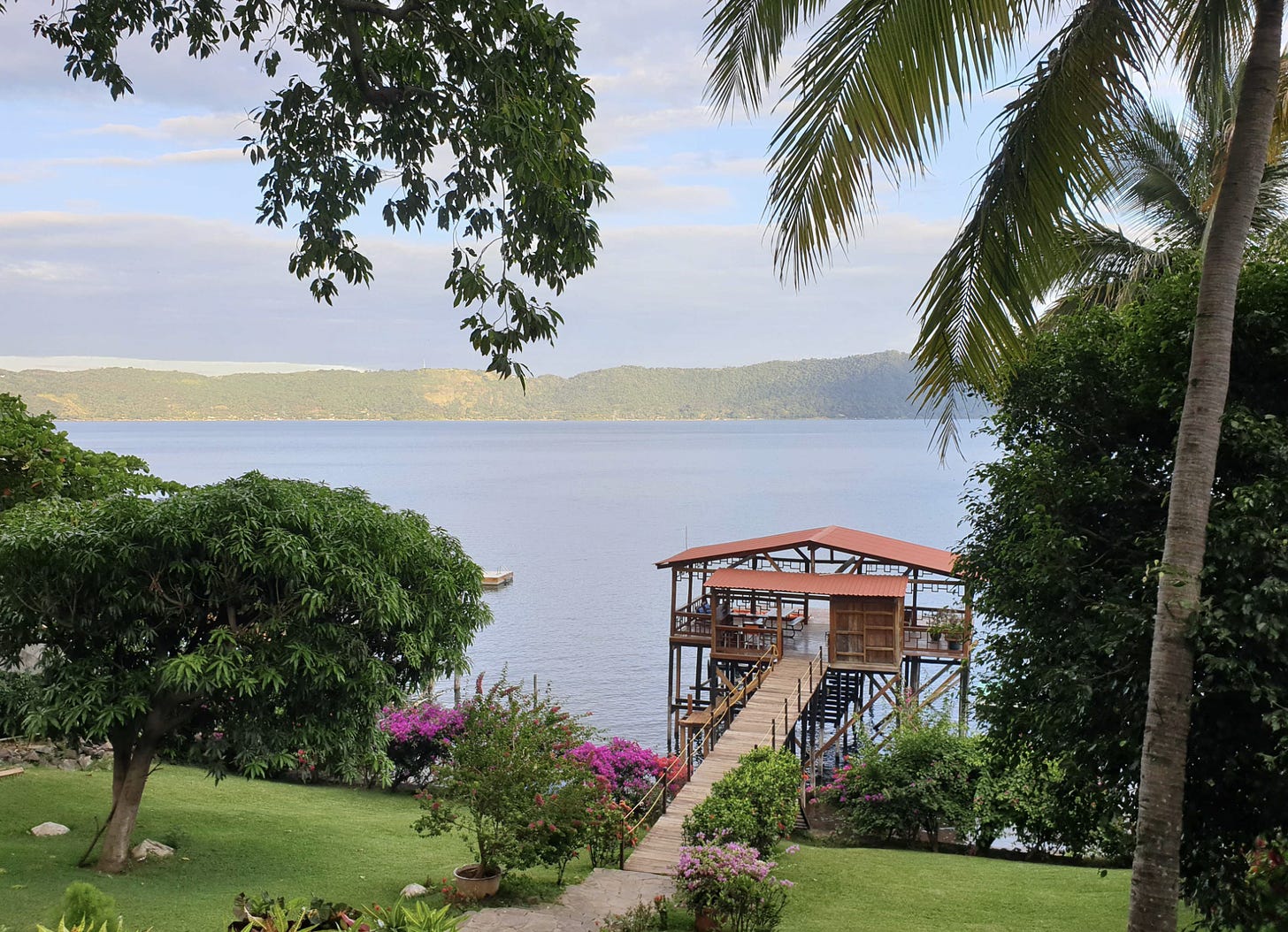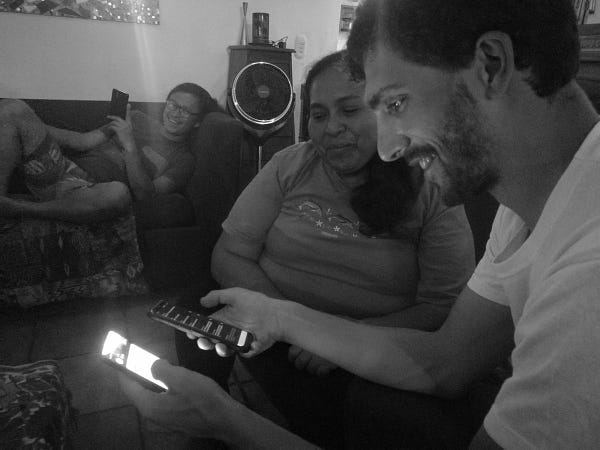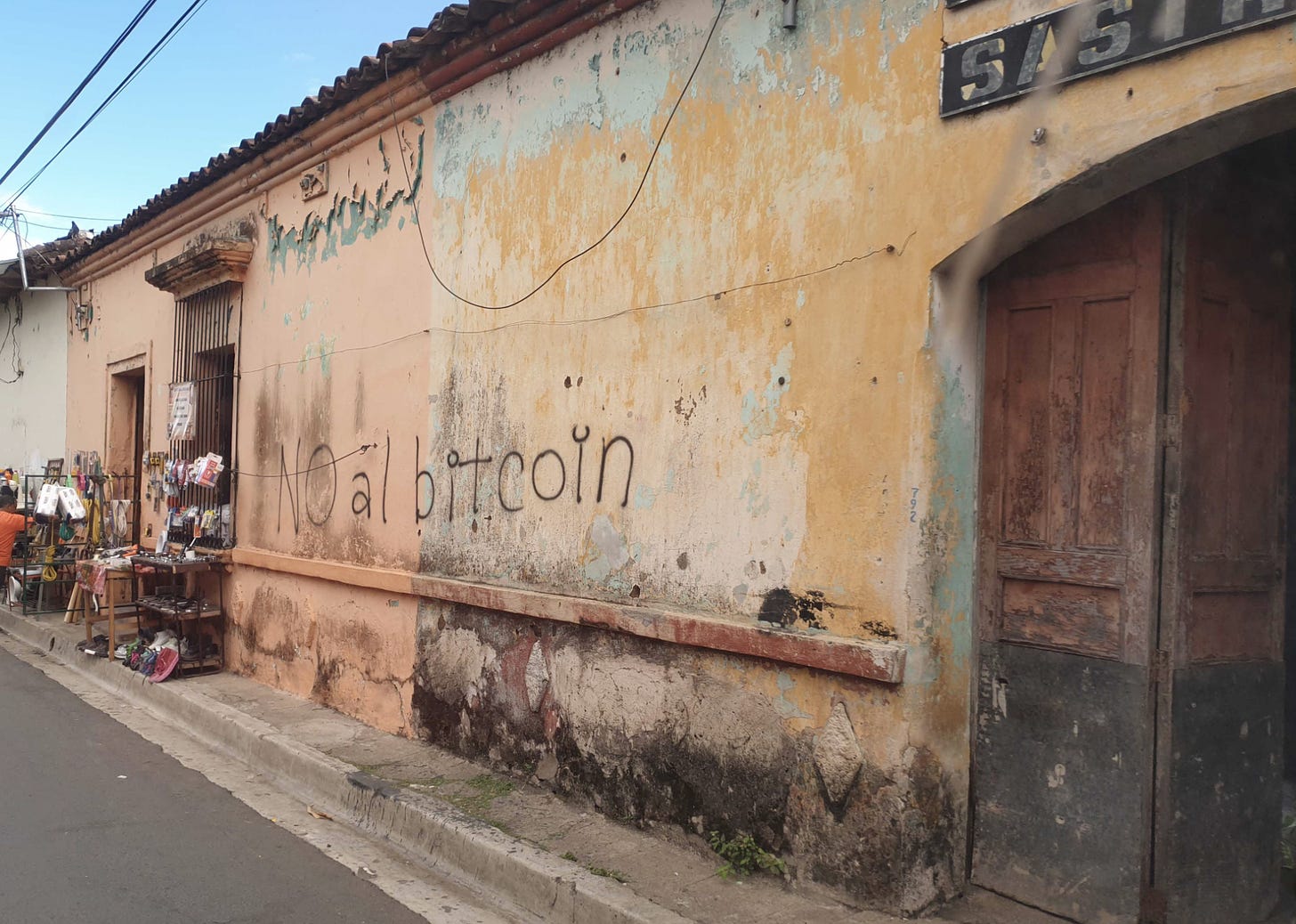
[This essay is one of 7 essays for The Tech Progressive Writing Challenge. Join the build_ Discord to join the conversation.]
In September 2021, El Salvador became the first country to adopt Bitcoin as legal tender. This week, it hosts the Adopting Bitcoin conference to learn about the local experience and expand to other countries.
I arrived in El Salvador 3 days ago to attend the conference and here are my first impressions.
But before, some background on El Salvador, the smallest country in continental America. Dotted with dozens of volcanoes, El Salvador also features great lakes and beautiful beaches. Historically inhabited by the Lenca, the Maya, and the Pipil peoples, Spain conquered El Salvador in the 16th century. It gained its independence from Spain in 1821. El Salvador became a mono-export economy: first based on indigo and then coffee. The economy has since diversified but in the 1980s, the Salvadoran Civil War, opposing the US-backed right-wing government to left-wing guerrillas—supported by the Soviet Union—ravaged the country. Thousands of Salvadorans died, many more left. Today, 2.3 million Salvadoran live in the US while 6.5 million live in El Salvador. Remittances from the diaspora still represent 24% of El Salvador’s GDP! In 2001, the government replaced the local currency with the US dollar to reduce inflation. Since then, El Salvador’s inflation has been lower than its neighbors’. However, it was already the case before the dollarization. So El Salvador lost control over its monetary policy, but what they got in exchange is unclear. The country is also plagued with gang violence and corruption. Its GDP per capita (PPP) stands at ~$9k/person.
In 2019, Nayib Bukele, a young Palestinian Salvadoran independent from the main political parties, became president. A wind of change for El Salvador! However, he was soon described as “authoritarian” for sending soldiers into the Legislative Assembly to encourage the passage of a bill…
In this context, in June 2021, at the Miami Bitcoin 2021 Conference, Nayib Bukele announced that his country would adopt Bitcoin in addition to the USD.
Why El Salvador? There was a precedent there: in 2019, an anonymous donor supported social projects in the beach town of El Zonte with “the only requirement to develop a bitcoin-based economy.” Gradually a Bitcoin economy emerged there. El Zonte was an incubator to experiment before expanding Bitcoin to the rest of the country.
Coming back to my trip: arriving in San Salvador, I was surprised to discover a modern and efficient airport with Bitcoin ATMs provided by Chivo (more on Chivo below) to withdraw cash using Bitcoin. I haven’t tried them, though.
We headed to the beautiful Lago de Coatepeque, where the local elite owns properties.
Our driver accepted Bitcoin, but we preferred to pay in cash as we had some. On the road, he complained about inflation. I was initially surprised because El Salvador is dollarized, and usually, inflation is an issue in countries where the government prints a lot of money. But El Salvador doesn’t print money…
Once at our Airbnb, we met with the housekeeper. She likes the Bitcoin Law, but she doesn’t understand Bitcoin, and she’s never used it. She also mentions that she hasn’t downloaded her Chivo wallet. So together with Romain Rouphaël and Victor Afanassieff from LNMarkets, we help her to activate her Chivo wallet :)
The process is simple; she instantly receives the $30 government reward.
But even after that, she still prefers to be paid in dollars as she says that no one around uses Bitcoin yet. She was right, we tried to pay in a dozen small shops and restaurants in the lake area, and only one accepted Bitcoin. Those who didn’t accept Bitcoin didn’t provide any reason, except one shopkeeper who told me his boss was from Guatemala and didn’t use Chivo.
Chivo is a custodial Bitcoin wallet launched by the Salvadoran government. You can receive and send USD1 and Bitcoin. When you receive Bitcoin, it can be automatically converted to dollars through a government fund (and vice versa). By default, payments between Chivo and another non-Chivo wallet are made onchain. (I don’t know how payments between Chivo wallets work). Lightning payments are possible, but the option is hidden and unavailable on the Chivo Merchant version. Chivo is only available to Salvadoran citizens: they need to take a selfie and a photo of their ID card to activate their account. Once done, they automatically receive the equivalent of 30 dollars in bitcoin! The minimum wage is ~$300/month, so it’s a huge incentive. In addition to that, Salvadorans get a 20% discount on gas if they pay with Chivo (However, we tried two gas stations, and they didn’t accept Bitcoin). Salvadorans are free to use other wallets, but because of these incentives, most Salvadorans who use Bitcoin only use Chivo.
But why does El Salvador promote Bitcoin that much? I initially thought that the Bitcoin Law was mainly a marketing operation. El Salvador wants to promote tourism: it has incredible beaches—hosting the World Surfing Championships— but before the Bitcoin Law, who knew El Salvador? However, the vast incentives offered by the government prove that it’s more than just marketing for foreigners.
Another explanation could be that, paradoxically, with Bitcoin, El Salvador can take back control of its currency. Indeed, as all citizens use the government Chivo wallet, linked to a real-life identity, the government could theoretically track all the transactions done. Because Salvadorans can theoretically withdraw their Bitcoins to another non-custodial wallet, I think this assumption is wrong.2
I was told another reason: Because El Salvador is dollarized, it is subject to the whims of the Federal Reserve. Before, the US had a more reasonable monetary policy, so dollarization was acceptable. But over the past two years, the US printed a lot of money. And the local saying goes: “When the US gets the flu, El Salvador sneezes” According to my contacts, the inflation could be even worse here because of the importance of remittances. For instance, when Salvadoran Americans received pandemic relief checks, they may have sent them directly to El Salvador, increasing inflation. However, looking at data, inflation in El Salvador and the US seem equal, and remittances to El Salvador seem to be constantly growing. So, according to this theory, Bitcoin could be an insurance policy for El Salvador: an exit of the US dollar system in case the Federal Reserve goes full money printing and hyperinflation follows.
What are the next steps for El Salvador?
Some Salvadorans associate Bitcoin with the government: if they don’t like the government, then they oppose Bitcoin. For Bitcoin to be widely accepted, it needs to transcend political lines.
Improve the Chivo wallet: the UX isn’t great, and it’s not Lightning by default.
Find a solution when there’s no signal. Because of volcanoes, the signal is often poor and Bitcoin (or any other crypto-currency) unusable. Should the government install Starlink over the country?
I’m now heading to San Salvador for the conference, and I’ll publish a sum up every day. If you have any questions about El Salvador, please let me know.
And to finish, proof-of-workout: 2 active volcanoes hiked in the same day (Santa Ana and Izalco)!


Our guide Salva, from Tunco Life, is fantastic. He offers excellent tours around the country: I strongly recommend him. And, of course, he accepts Bitcoin! 🚀
The El Salvador Series:
El Salvador: First impressions (this article)
I don’t know how USD on Chivo
Although in practice, I heard there were some issues to move your funds out of Chivo.









Very interesting details to learn about your experience there. I look forward to the next reports. Enjoy!
Thanks for sharing this interesting experience!